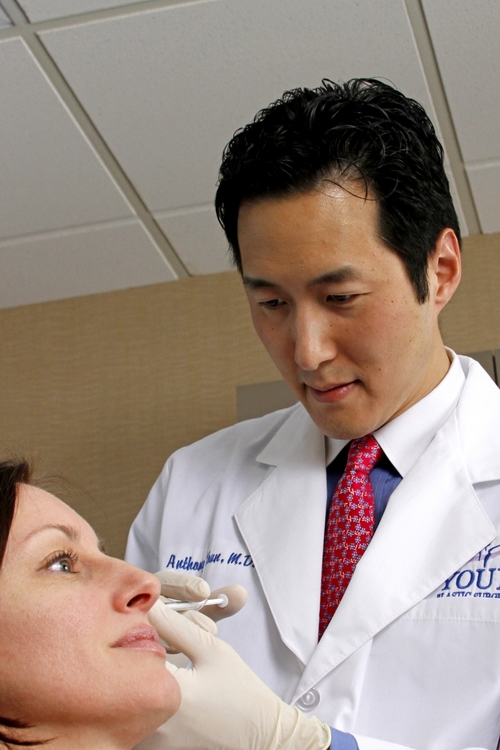
An Oakland University William Beaumont School of Medicine professor led a study sure to answer a burning question in the minds of many a social media user — what Instagram filter makes people look best?
“What is the Ideal Instagram Filter?” was written by Anthony Youn, M.D., FACS, and assistant professor, Department of Surgery, Oakland University William Beaumont School of Medicine. It was published July 17 by Aesthetic Surgery Journal, an official publication of The Aesthetic Society.
In the study, Youn said that the filters determined to be “Most Flattering” were, in order, Juno, Lark, and Sierra. The filters determined to be “Most Youthful” were Reyes, Rise, and Gingham. The filters voted “Least Flattering” were Hefe, X-Pro, and Slumber. “Least Youthful” filters were Perpetua, Crema, and Aden.
Casting aside the “gee whiz” aspect of the findings, Youn said there are medical reasons behind what he identifies as a first-of-a-kind study.
“I came up with the idea of the study after seeing so many patients bring their filtered photos with them to their consultations,” Youn said. “I noticed that they all seemed to bring photos that appeared to be filtered similarly, so it got me to thinking...there must be something here that we can examine and learn from.”
Board-certified surgeon, author and social media influencer
Youn is a board-certified plastic surgeon. He is the author of the best-selling books “The Age Fix: A Leading Plastic Surgeon Reveals How To Really Look Ten Years Younger" and "In Stitches: A Memoir."
His public television special, The Age Fix with Dr. Anthony Youn, has been viewed by millions. Youn also hosts a podcast called The Holistic Plastic Surgery Show.
His new book, "Playing God: The Evolution of a Modern Surgeon," details his “humorous, heartwarming, and often harrowing journey to become a leading plastic surgeon.”
Youn also is no stranger to social media. He estimates having nearly 200,000 followers across various social media channels, including Facebook, Instagram, and YouTube. He said it makes sense for him to have a strong presence on social media.
“Not a day goes by now when I don’t hear from a patient that follows me on social media,” he said. “We are seeing so many patients influenced by social media to undergo cosmetic procedures. Many of them bring in their filtered photos to help convey what they are looking for.”
Instagram reportedly has nearly 1 billion registered users. Youn said for plastic surgeons it’s become today’s “platform of choice to interact with patients, likely due to its highly visual nature.
In the study, Youn points out that recent surveys reveal that social media apps like Instagram are encouraging patients to undergo cosmetic procedures, especially in the millennial population.
According to the annual Cosmetic Surgery National Databank Statistics from the American Society for Aesthetic Plastic Surgery, the number of facial injectable treatments increased by more than 33 percent from 2017 to 2018 in patients between the ages of 18 and 34. The American Academy of Facial Plastic and Reconstructive Surgery revealed in 2017 that facial plastic surgeons are reporting that more and more patients are bringing selfies with them to demonstrate their perceived flaws.
Surgery based on filtered selfies
Youn said the term “Snapchat Dysmorphia” has even been coined to describe patients requesting plastic surgery in order to look like their filtered selfie.
“This trend is concerning, because filtered selfies can present an unattainable appearance and blur the line between reality and fantasy for some patients,” Youn said, noting one study of adolescent girls found a connection between filtering selfies and increased body dissatisfaction.
“Although filtering photos may have a detrimental psychological effect for some, it appears that photo filters are here to stay,” Youn said. “If plastic surgeons and patients can utilize filters to help in communicating patient desires, expectations, and potential results, then it is possible that these can provide a valuable tool for doctor-patient communication.”
Youn collected survey data from 78 of his patients for the study.
In it, he presented three photos of women, ages 38, 48, and 58. Respondents (all women) were asked which filters made those in the photos appear “Most Flattering,” “Most Youthful,” “Least Flattering,” and “Least Youthful.”
For example, the study indicates the Reyes filter — voted “Most Youthful” — makes a face appear brighter and smoother.
“It is unsurprising that (Reyes) makes photos look most youthful because it erases wrinkles, reduces dark circles, lightens blemishes, and gives a smooth, even sheen to the face,” Youn said in the study.
The study acknowledges being small “with several limitations.”
Still, Youn said “This study is the first of its kind to determine scientifically which filters are superior to others for being flattering and youthful.”
“I think it will set the stage for more studies like it, especially focusing on different ethnicities, ages, and genders,” he added.

